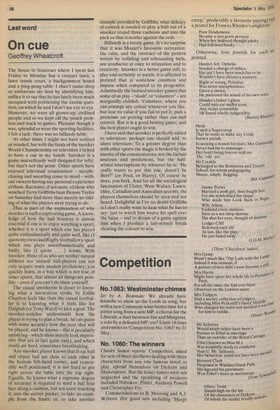Last word
On cue
Geoffrey Wheatcroft
The house in Somerset where I spent last Friday to Monday has a croquet lawn, a lawn tennis court, a backgammon board and a pin g-pong table. I shan't name-drop or embarrass my host by identifying him; suffice it to say that he has lately been much occupied with politicising the canine question, on which he and I don't see eye to eye. However, we were all grown-up, civilised people and so we kept off the pooch problem and stuck to games. Pleasant though it was, splendid as were the sporting facilities, I felt a lack: there was no billiards table.
At other times I might not have noticed or minded, but with the finals of the snooker World Championship on television I itched to have a cue in my hands. Snooker is a game marvellously well designed for telly; but that's not the point. Other sports have enjoyed televisual renaissances — steeplechasing and wrestling come to mind — without viewers having any personal experience of them. But many, if not most, of those who watched Terry Griffiths beat Dennis Taylor on Saturday had more than merely an inkling of what the players were trying to do.
That is part of the explanation of why snooker is such a captivating game. A knowledge of how the ball bounces is almost essential if one is to enjoy watching a sport, whether it is a sport which one has played quite enthusiastically and quite well, like (I quote my own case)Rugby football,or a sport which one plays unenthusiastically and badly, like (I quote . . . ) tennis. With snooker, those of us who are neither natural athletes nor natural ball-players can not only acquire some modest proficiency; you quickly learn, in a way which is not true of other sports, that almost all things are possible — even if you can't do them yourself.
The casual snookerite is closer to knowing what a miraculous stroke by Eddie Charlton feels like than the casual footballer is to knowing what it feels like for Dalglish (or Tony Ward) to kick a goal. The snooker-watcher understands how the player is trying to plan a break; he can guess with some accuracy how the next shot will be played; and he knows — this is peculiarly satisfying— which shots merely look impressive (but are in fact quite easy), and which really are hard, sometimes breathtaking.
Any snooker player knows that if cue ball and object ball are close to each other in the bottom left-hand corner, and reasonably well positioned, it is not hard to pot right across the table into the top right. Equally, he knows what a supreme degree of accuracy is required to send a ball four feet along a cushion, but not quite touching it, into the corner pocket, to take an example from the finals; or, to take another example provided by Griffiths, what delicacy of control is needed to play a ball out of a snooker round three cushions and into the pack so that it. nestles against the reds.
Billiards is a lovely game. It's no surprise that it was Mozart's favourite recreation: the calm, and the intricacy of the pattern woven by colliding and rebounding balls, , are conducive at once to relaxation and to creativity. Snooker is a better game still, to play and certainly to watch: it is affected to pretend that is somehow common and impure when compared to its progenitor. Admittedly the bastard snooker games that some of us play — 'slosh', or 'volunteer' — are marginally childish. Volunteer, where you can attempt any colour whenever you like, but lose its value if you fail to pot it, puts a premium on potting rather than cue-ball control. But it is a good betting game; and the best player ought to win.
I have said that snooker is perfectly suited to television: perhaps one should add, to silent television. To a greater degree than with other sports the magic is broken by the inanity of the commentators; not the factual analyses and predictions, but the halfwitted interruptions by whoever-he-is: `He really wants to pot this one, doesn't he Bert?' (or Fred, or Harry). Of course he does, you berk. And for all the sociological fascination of Ulster, West Walian, Lancashire, Canadian and Australian accents, the players themselves should be seen and not heard. Delightful as I've no doubt Griffiths is I don't really want to hear what he has to say: just to watch him weave his spell over the baize — and to dream of a game against him when I produce a last-minute break clearing the colours to win.










































 Previous page
Previous page